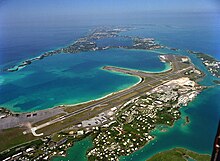NAS Bermuda
| Naval Air Station Bermuda | |||||||||||
|---|---|---|---|---|---|---|---|---|---|---|---|

Aerial view of NAS Bermuda, 1993.
|
|||||||||||
| Summary | |||||||||||
| Airport type | Military: Naval Air Station | ||||||||||
| Operator | United States Navy | ||||||||||
| Location | St. David's Island | ||||||||||
| In use | 1970 - 1995 | ||||||||||
| Elevation AMSL | 12 ft / 4 m | ||||||||||
| Coordinates | 32°21′51″N 064°40′43″W / 32.36417°N 64.67861°W | ||||||||||
| Runways | |||||||||||
|
|||||||||||
Naval Air Station Bermuda (Kindley Field), was located on St. David's Island, Bermuda from 1970 to 1995, on the former site of Kindley Air Force Base. It is currently the site of Bermuda International Airport.
The US Navy moved its anti-submarine air-patrol operations from the old NAS Bermuda flying boat base, to the USAF Base at Kindley Field when its Martin P5M Marlin flying boats were removed from service in the 1960s. They were replaced by Lockheed P-2 Neptune landplanes, which could not operate from the existing Naval Air Station, which had no hard surface runway ashore. The US Navy took over the airfield entirely from the USAF in 1970 and the base continued to operate anti-submarine patrols, first with Neptunes, then with Lockheed P-3 Orions. In the 1980s, the P-3s were occasionally augmented by carrier-based S-3 Vikings operating ashore, as well as Canadian Forces' Lockheed CP-140 Aurora and Royal Air Force Hawker Siddeley Nimrod MR.2 aircraft.
By the early 1990s, the range of submarine-launched ballistic missiles (SLBM) had so increased that Soviet submarines no longer found it necessary to come within range of Bermuda-based patrol aircraft in order to strike their targets in the United States. This was followed by the dissolution of the Soviet Union in 1991 and a general lessening of tensions between the now renamed Russian Federation and the US.
...
Wikipedia
